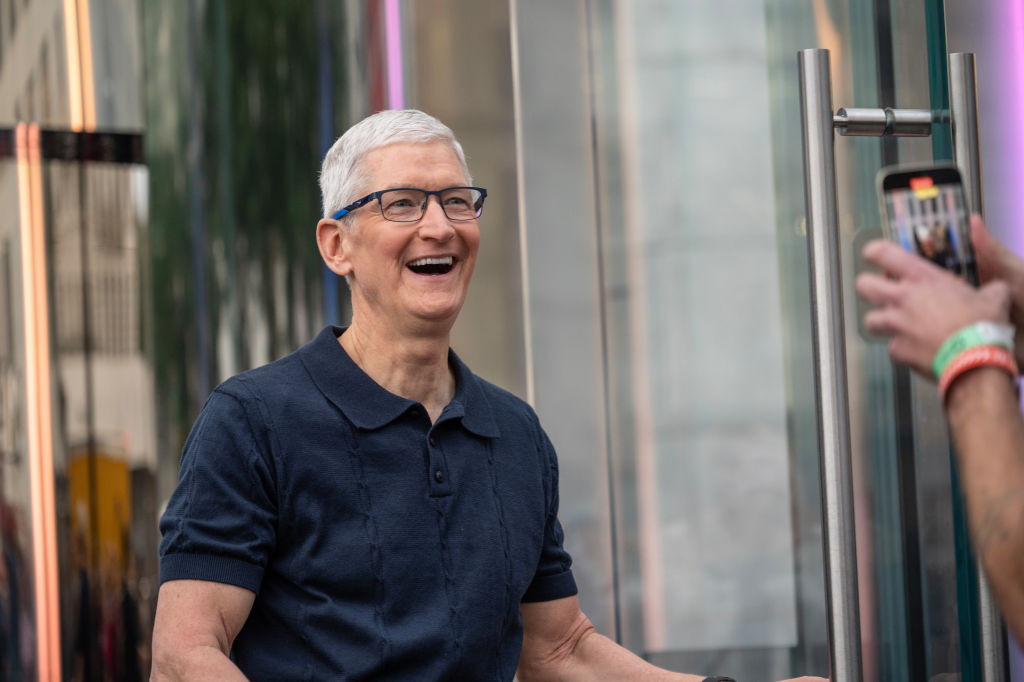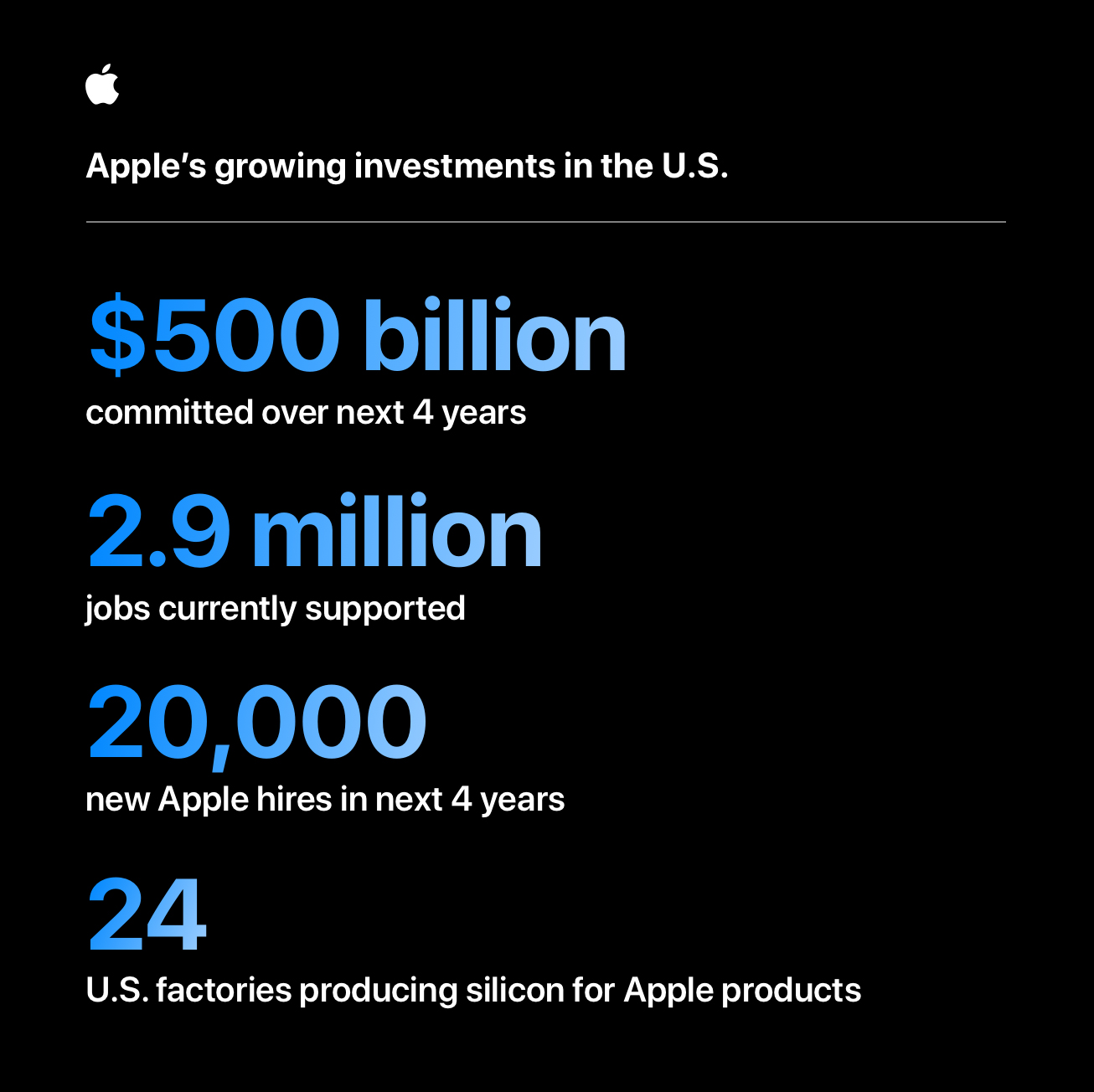Apple says it will spend $500 billion in US over next four years as it faces down Trump tariffs
Spending is said to include over 20,000 new American workers and the production of servers in Texas.

Apple today announced a plan to spend $500 billion in the United States in the next four years, including in jobs, suppliers, and building servers. This comes as Apple — like most consumer electronics companies — faces down a threat of tariffs from importing goods and components from China and other countries from President Donald Trump.
The company says this is its biggest US-focused spending plan to date. Beyond jobs, it includes paying US-based suppliers, including factories owned by Texas Instruments and TSMC. Apple will build servers for Apple Intelligence at a facility in Houston, and claims it will increase its Advanced Manufacturing Fund and establish an "academy" in Michigan to "train the next generation of U.S. manufacturers, and grow its research and development investments in the U.S. to support cutting-edge fields like silicon engineering."

Following a meeting between Trump and Apple CEO Tim Cook last week, Trump said that Cook was ceasing plants in Mexico and would increase its spend in the US. “They don’t want to be in the tariffs,” he told U.S. state governors. It's unclear which Mexican facilities Trump was referring to, though Apple supplier Foxconn has some plants there, Bloomberg points out.
The Trump administration has put a 10% tariff on goods imported from China and has mentioned, but not yet enacted, a 25% tariff on chips.
Apple made a similar announcement in 2018 during the first Trump administration, including jobs and a campus in Austin, Texas. It's unclear which, if any, of the investments discussed recently were previously planned prior to Trump entering office for his second term. During the first term, Trump took credit for Apple's Mac Pro plant run by a contractor, which was already in operation.
In 2021, Apple announced more U.S.-based spending plans, including a $430 billion investment including a North Carolina campus, as well as jobs in silicon engineering and research and development. (That campus is currently on pause).
"We are bullish on the future of American innovation, and we’re proud to build on our long-standing U.S. investments with this $500 billion commitment to our country’s future,” Cook said in a press release. Notably, the hiring commitments come at a time when much of big tech is going through layoffs.
Cook's plans for US investments helped Apple during Trump's first terms, earning it exceptions from some tariffs on its biggest devices, including the iPhone. This time around, it appears other tech executives, including Meta CEO Mark Zuckerberg and Amazon chairman and former CEO Jeff Bezos, are trying to follow Cook's playbook by cultivating relationships with the president.
Get Tom's Hardware's best news and in-depth reviews, straight to your inbox.

Andrew E. Freedman is a senior editor at Tom's Hardware focusing on laptops, desktops and gaming. He also keeps up with the latest news. A lover of all things gaming and tech, his previous work has shown up in Tom's Guide, Laptop Mag, Kotaku, PCMag and Complex, among others. Follow him on Threads @FreedmanAE and BlueSky @andrewfreedman.net. You can send him tips on Signal: andrewfreedman.01
-
TechieTwo Nice to see some jobs coming back to the U.S. after so many companies exported them to China for increased CEO compensation.Reply -
bit_user Reply
$430B in a single campus??? That has to be a mistake, or else were they going to like coat everything in gold and platinum?The article said:In 2021, Apple announced more U.S.-based spending plans, including a $430 billion investment in a North Carolina campus -
sygreenblum Reply
It says including the campus, R&D and training, among other things. Apple already spends $30 billion just on R&D, so over 4 years that would $120 billion right there. If they increase spending then obviously that number will be higher.bit_user said:$430B in a single campus??? That has to be a mistake, or else were they going to like coat everything in gold and platinum? -
techskier Reply
Now it will only take about a thousand companies to do the same before the desired outcome of tariffs will happen.TechieTwo said:Nice to see some jobs coming back to the U.S. after so many companies exported them to China for increased CEO compensation. -
helper800 Reply
Tariffs or not, all consumers will be getting higher prices either due to tariffs or the increased cost of doing business in the US.techskier said:Now it will only take about a thousand companies to do the same before the desired outcome of tariffs will happen.
20k extra jobs in the US at the cost of 339,980,000 Americans having to spend 10%+ more on apple products.TechieTwo said:Nice to see some jobs coming back to the U.S.
Do you have some data on this point? My understanding was that most companies exported their manufacturing jobs overseas because if they didn't they would go out of business, not that they needed more CEO compensation.TechieTwo said:so many companies exported them to China for increased CEO compensation. -
drtweak It does say it is for Apple Servers though, nothing about iPhone, iMacs, Macbooks. So doesn't look like it will help the basic consumer unless they move production to those once it opens.Reply
Honestly didn't even know Apple still made servers. -
bit_user Reply
It's an area of recent expansion.drtweak said:Honestly didn't even know Apple still made servers.
https://techcrunch.com/2024/12/11/apple-reportedly-developing-ai-server-chip-with-broadcom/ -
bit_user Reply
The article mentions manufacturing moving from Mexico. What's interesting about building a plant in Texas is that it could be partially staffed by the same workers, as I believe large numbers of commuters cross the southern border, on a daily basis, who live in Mexico but work in the US. I'm not sure what kind of visa or work authorization that requires.TechieTwo said:Nice to see some jobs coming back to the U.S. after so many companies exported them to China ... -
why_wolf Reply
All the big tech companies make their own custom servers. Facebook does, Google does, Microsoft does, Amazon does. Its for their own internal consumption, not something they will ever sell to other companies.drtweak said:It does say it is for Apple Servers though, nothing about iPhone, iMacs, Macbooks. So doesn't look like it will help the basic consumer unless they move production to those once it opens.
Honestly didn't even know Apple still made servers.
This is really Apple announcing they aren't going to buying Nvidia GPUs to run their AI server farms. Not really a surprise Apple does everything it can to not pay the giant margins for other peoples tech. -
bit_user Reply
Technically, I think those are built-to-order, from contract manufacturers. I'm pretty sure none of them have their own factories for this. For instance, the article mentioned Foxconn.why_wolf said:All the big tech companies make their own custom servers. Facebook does, Google does, Microsoft does, Amazon does. Its for their own internal consumption, not something they will ever sell to other companies.
FWIW, Google, Meta, and Microsoft are all Platinum members of OCP:
https://www.opencompute.org/membership/membership-directory#platinum
Amazon is listed only as a "Community" member, which appears to be the lowest tier.
Yeah, in terms of margins and supply constraints, I'm sure Apple doesn't appreciate having to deal with Nvidia. However, in general, I suspect a big factor is that Apple just wants to live in its own ecosystem, running its own OS and software, and optimizing its code for its own hardware.why_wolf said:This is really Apple announcing they aren't going to buying Nvidia GPUs to run their AI server farms. Not really a surprise Apple does everything it can to not pay the giant margins for other peoples tech.